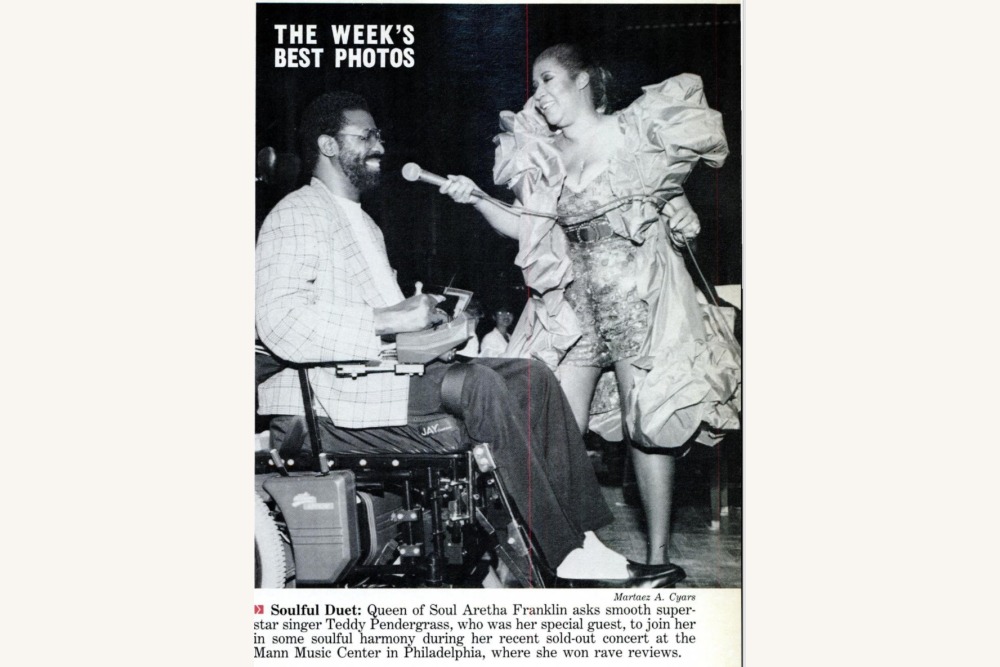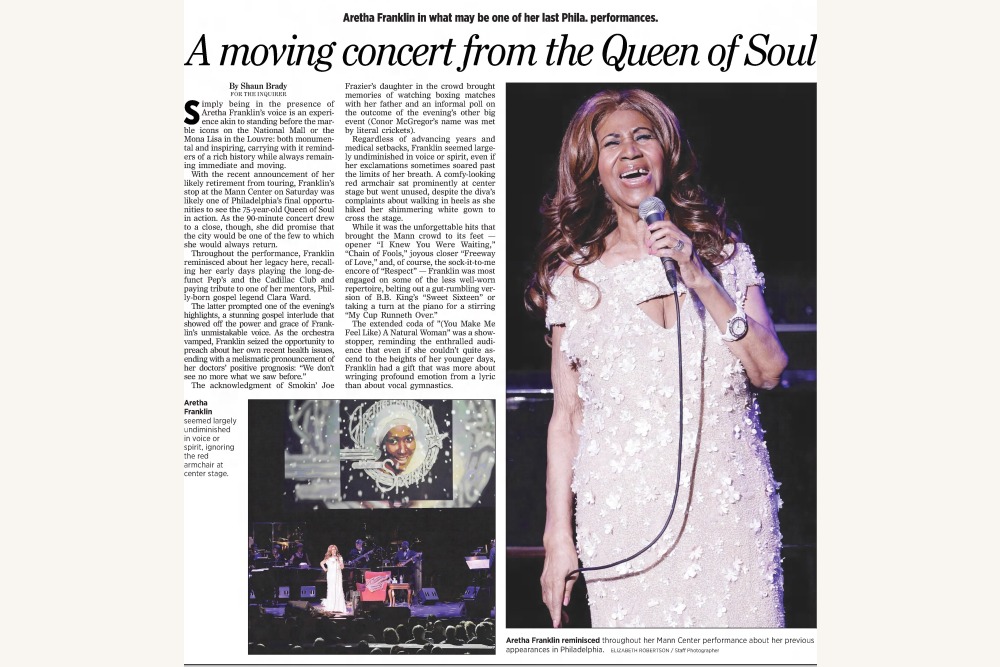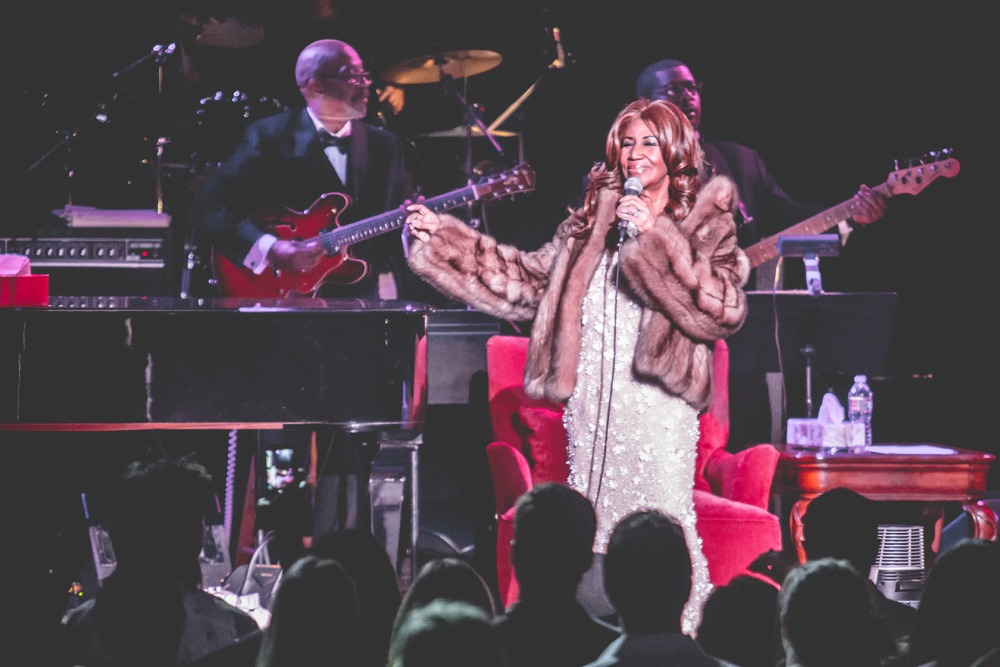From the Vault: Aretha Franklin at the Mann Center
MANN MUSIC ROOM: VAULT
Blog Entry by Jack McCarthy, Historian, The Mann Center for the Performing Arts
The Mann Center traces its history to the Robin Hood Dell, which opened in 1930 in East Fairmount Park as a summer home for The Philadelphia Orchestra. In 1976 the organization moved to a new venue in West Fairmount Park. Originally called Robin Hood Dell West, it was later renamed the Mann Music Center in honor of its longtime director and benefactor Frederic Mann, and subsequently renamed the Mann Center for the Performing Arts.
Aretha Franklin, the “Queen of Soul,” one of the great voices in the history of American popular music, gave the second-to-last full public concert of her nearly sixty-year career at the Mann Center on August 26, 2017. Battling cancer and with her concertizing future in doubt, Franklin used the occasion to reflect on her long history with Philadelphia and the city’s importance in her early years, noting at one point during the show, “I started, really, in Philadelphia.”
Born in Memphis in 1942, Aretha Franklin grew up in Detroit, where her father, the Reverend C. L. Franklin, a renowned preacher and singer known as the “Man with the Golden Voice,” was pastor at a Baptist church. Steeped in the African American gospel tradition from birth, Aretha was mentored by several great gospel singers, including Clara Ward, leader of the Philadelphia-based Famous Ward Sisters, the most successful gospel group of the mid-twentieth century. C. L. Franklin had a longtime relationship with Clara Ward, who was a mother figure to and major musical influence on Aretha, as was another member of the Famous Ward Singers, Marian Williams.
From 1960 to 1965 Aretha recorded for Columbia Records, during which time she performed frequently in Philadelphia jazz and R&B clubs, such as Peps, the Showboat, and the Cadillac Club. She also appeared on the multi-act bills at the Uptown Theater, the famous North Philadelphia mecca for R&B and soul music. Some of these engagements were arranged by Del Shields, a DJ on WDAS, the city’s premier Black radio station. Another WDAS DJ, Louise Bishop, would soon play a role in Aretha’s rise to superstardom.
Aretha had begun to make a name for herself in the early 1960s, but never achieved great success with Columbia Records, which was trying to mold her as a jazz and pop singer. By the mid-1960s she had become disillusioned with the label. Aware of this, in 1966 Aretha’s friend Louise Bishop called Atlantic Records producer Jerry Wexler, who had had success with Ray Charles, Wilson Picket, Solomon Burke, and other singers in the new gospel-influenced style called “soul” that Atlantic had helped to popularize. Wexler signed Aretha to Atlantic Records and gave her the freedom to craft her music the way she wanted, allowing her to choose songs and create arrangements in keeping with her gospel roots and that showcased her unique vocal gifts. The result was a string of hits beginning in 1967 that have since become iconic songs in American popular music: “Respect,” “Chain of Fools,” “Think,” “I Never Loved a Man the Way I Love You,” “(You Make Me Feel Like A) Natural Woman,” and many others.
By the late 1960s and early 1970s, Aretha had outgrown clubs and was headlining shows at Philadelphia’s largest concert venue, the Spectrum. Her career ebbed and flowed somewhat in the years that followed as musical tastes changed and new styles emerged, but she remained a major star. She first performed at the Mann Center on July 3, 1992, in a free concert that opened the city’s three-day July 4th “Sounds of Freedom” festival. Accompanied by The Philadelphia Orchestra, Franklin sang many of her hits, as well as Paul Simon’s “Bridge Over Troubled Water,” a song that had become one of her concert staples. An excellent pianist, she sang the song accompanying herself on the piano. A highlight of the night was when she brought out soul singer and Philadelphia native Teddy Pendergrass to sing a few songs with her. Pendergrass had been one of the biggest performing and recording artists in the world when he was paralyzed in car accident on Lincoln Drive in Philadelphia in 1982. He made a successful comeback several years later, singing from a wheelchair, which is how he performed with Aretha at the Mann.
Aretha Franklin headlined at the Mann Center again in 2002 and 2010. The latter was a benefit concert on July 27, 2010, for the Mann’s educational and community engagement programs. It drew considerable attention for the fact that Aretha shared the stage with former U.S. Secretary of State Condolezza Rice, who is also a classical pianist. After opening the concert with Leonard Bernstein’s Candide Overture, The Philadelphia Orchestra and conductor Rossen Milanov, then Artistic Director at the Mann, accompanied Rice in the second movement of Wolfgang Amadeus Mozart’s Piano Concerto in D Minor. The second half of the concert was devoted to Aretha, who sang her many hits but also two opera arias, a genre she had begun to explore later in her career. She had famously stepped in at the last minute for an ailing Luciano Pavarotti at the 1998 Grammy awards to give a stirring rendition of the beloved Giacomo Puccini aria “Nessun Dorma,” a performance that soon became legendary. At the 2010 Mann concert, Aretha sang “Nessun Dorma” and an aria from Christoph Willibald Gluck’s opera Orfeo ed Euridice. The concert concluded with Rice returning on piano to join Franklin in the latter’s 1968 hit “I Say A Little Prayer” and “My Country ‘tis of Thee.” Almost 10,000 attended the concert, which raised nearly $600,000 for the Mann’s education and engagement programs.
Franklin’s next and final concert at the Mann seven years later almost did not happen. She had been battling pancreatic cancer, a slow moving disease, since 2010 and by the mid-2010s the illness had begun to impact her career. She embarked on a series of concerts in the summer of 2017 that were billed as a farewell tour, with most of the shows spaced several weeks to a month apart, but even that schedule was proving too much. A June 10th concert in her hometown of Detroit was touch and go until the very last minute, due to her frail condition. She ultimately did the show, but had to cancel a July 1st concert in Toronto. Then she rallied for shows at Wolf Trap in Virginia on July 29th and the Mann on August 26th.
The 90-minute Mann show was filled with many of Aretha’s hits, along with some lesser-known numbers and a spirited ten-minute gospel medley. She introduced the latter by noting that the songs were made popular by “one of my mentors, who comes from the City of Brotherly Love … Clara Ward and the Ward Singers. They were so bad [i.e., good], it was ridiculous.” Later, while noodling at the piano as she was about to sing “Brand New Me,” she reminisced, “You know I started, really, in Philadelphia. I played all over Philadelphia,” giving shout outs to Peps, the Cadillac Club, and Del Shields. She closed the show with a lively version of her 1985 hit “Freeway of Love,” followed by her enduring anthem "Respect” as an encore. After singing the final verse, Aretha slowly danced her way off the stage—gingerly, but with obvious joy—as the band closed the song out. (There are many videos of the concert on YouTube.)
Aretha Franklin’s final full concert was at the Ravinia Festival outside Chicago on September 3rd. Then on November 7th she did a short set at the Elton John Aids Foundation benefit concert at a church in New York City, her final public appearance. She died on August 16, 2018, at her home in Detroit.



